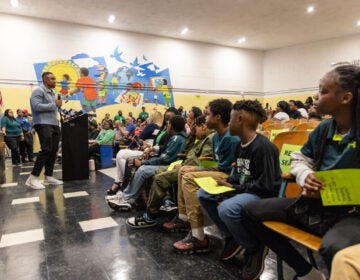Philadelphia schools 2014: the budget crisis continues
ListenThe new normal in Philadelphia’s public school system has become inadequately resourced classrooms, labor strife and an ongoing contention between traditional public and charter schools – issues that were intensified in 2014.
In the 2013-14 school year, Philadelphia School District principals operated on razor thin budgets; children often lacked access to guidance counselors and nurses; and hallways were devoid of the support staffers necessary to provide stability for an extremely at-risk student population.
The district’s most vulnerable students – often those with special education needs – especially suffered as staffing shortfalls caused student caseloads to balloon.
WHYY shone light on a teacher who filed a complaint with the state as her caseload grew beyond legal limits. All the while, she drowned in the knowledge that she couldn’t provide her students with the help and attention they deserved.
Although the teacher quit at the end of the year, her story compelled the district to hire enough special-ed teachers to meet legal requirements.
As classrooms suffered the consequences of conditions that Superintendent William Hite repeatedly called “inadequate,” tensions between the district and the teachers’ union grew as they attempted to negotiate a new contract.
Facing a large structural deficit, district leaders insisted on a concessionary contract that included reductions to salary and benefits, as well as work-rule changes that would help the district compete with non-unionized charter schools.
In the district’s eyes, these changes have become increasingly necessary as many of the city’s students turn away from neighborhood school options towards charters.
WHYY profiled one North Philadelphia family representative of the many who feel the only real options for a good, safe education in the city are either the district’s selective admission magnet schools or charters.
Despite the continuing exodus of district students to charters, the school district learned a crucial lesson in 2014 about the fickleness of school choice.
When it attempted to turn two of its lower performing elementary schools over to charter operators, parents voted overwhelmingly to keep their neighborhood schools under district control.
In the context of that election, WHYY joined parents on a tour of a charter school that turned into a microcosm of the city’s greater education debate.
As the 2013-14 school year came to a close, the district faced a steep budget deficit for the following school year. Fearing schools would become mere “empty shells” if they opened with the available cash, Superintendent Hite threatened to shorten the school year.
WHYY followed all of the twists and turns of the budget negotiations in Harrisburg, as politics – and then-Gov. Tom Corbett’s reelection campaign – swirled around the district’s hope for increased funding.
Eventually, with the promise of new cigarette tax revenue, schools opened on time without major layoffs.
Still, resources were bare, and educators braced themselves for another school year where they knew students would lack access to the basics supports enjoyed by most school districts across the state.
By early October, with contract talks between the district and the teachers union stalled, the School Reform Commission held a barely publicized, last-minute meeting to cancel the teachers’ contract and impose health-care concessions.
Reaction to this news exploded at the SRC’s next public meeting, as teachers union members and supporters shut down North Broad outside of district headquarters in protest.
(In January 2015, the Pennsylvania Commonwealth Court declared the SRC’s action unlawful.)
As 2014 winded down, despite a seemingly unending flow of contentious news surrounding the Philadelphia school district, many community groups increased their support of traditional public school options.
WHYY highlighted this movement with a feature on the young-professional millennials and gen x-ers who have been investing in their neighborhood public schools long before their children become school-aged.
WHYY is your source for fact-based, in-depth journalism and information. As a nonprofit organization, we rely on financial support from readers like you. Please give today.





